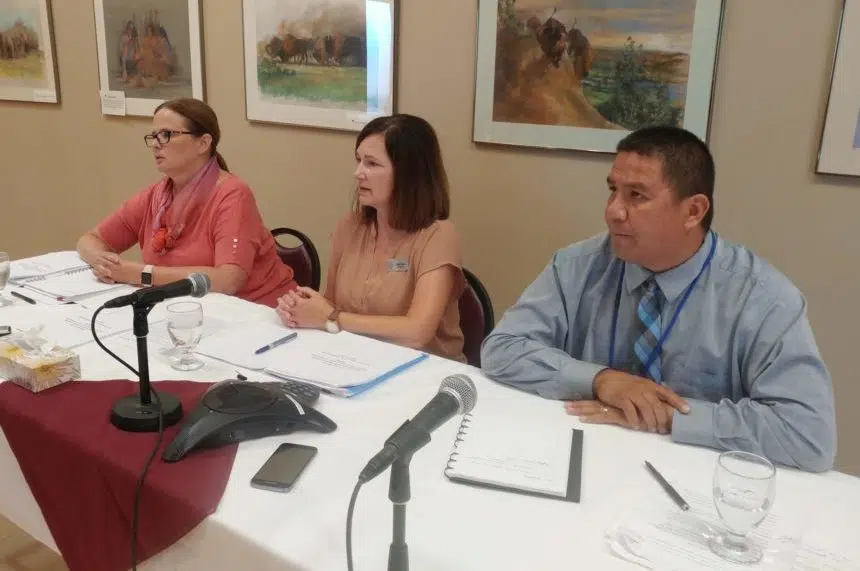The Saskatoon Health Region (SHR) is apologizing to Indigenous women as an external review reveals doctors, nurses and social workers coerced several mothers into getting their tubes tied after giving birth.
The review was set in motion after stories started surfacing in 2015. One woman, Sylvia Tuckanow, went public in January 2017 with her account of having a tubal ligation procedure at Royal University Hospital.
The 56-page review from Manitoba-based Métis doctors Yvonne Boyer and Judith Bartlett was released Thursday. It detailed interviews with seven Indigenous women who felt they were pressured or coerced into tubal ligations when they gave birth at a Saskatoon hospital.
The report stated the women felt “invisible, profiled and powerless” while interacting with health care workers immediately before, during and after delivery of a child.
Most of the women interviewed told reviewers they had repeatedly said no to staff who were pressuring them into the procedure, which permanently prevents future pregnancies.
“It feels like, if you go to the doctor to have a broken finger fixed and they cut off your hand to fix the finger problem,” one woman is described as saying in the report.
“I went to have a baby, not a tubal ligation.”
The review said interviews with affected women indicated “scare tactics” were used by some health professionals to secure consent for the procedure.
“I said, ‘No, no,’ and the doctor would tell me stories, about women. ‘A woman had her first C-section and passed away with her firstborn,’ and the tubal ligation came up again,” a woman describes.
Jackie Mann, vice-president of Integrated Health Services with SHR, said the region was “deeply sorry” for what the women experienced.
“We are thankful to the women who had the courage to come forward,” she said. “You have been heard and will be listened to.”
She noted the SHR had already adjusted their tubal ligation policies in fall 2015, requiring a conversation with a doctor before arriving for delivery in order to receive the procedure.
The review noted the policy change may have had a direct impact. In 2010, 94 tubal ligations immediately after delivery were recorded. In 2015, there were only 20.
Mann also promised to tackle racism within Saskatoon’s health system after interviews with eight SHR workers indicated “systemic discrimination” towards Indigenous women.
The workers indicated Indigenous women were already at a higher stress level during delivery due to Child and Family Services staff being on-hand to seize some newborns.
“What has been happening with apprehensions is similar to residential schools,” one worker told the review.
Several of the Indigenous women affected relayed to reviewers they were judged for how many kids they already had.
Director of Maternal Health Services LeAnn Smith said her management group would take action if any staff are caught engaging in racist behaviour.
“We will go through our collective bargaining agreement on the progressive coaching and discipline,” she said.
“This is important to us.”
Boyer and Bartlett concluded their review with 10 calls to action, including:
- Engaging health staff with mandatory cultural training starting in professional school
- Installing an advisory council comprised of elders, grandmothers and community members with authority over Indigenous health care
- Restructuring Indigenous health care options in Saskatoon by collaborating with the community
- Apologizing to those who felt they were coerced into tubal ligation
The SHR health board met with elders of the Indigenous community throughout the morning Thursday to discuss the report and implementation of the recommendations.
Director of First Nations and Metis Health Services Gabe Lafond echoed Mann and Smith’s commitment to following the recommendations.
“We’re going to collaborate so we can do the right thing,” he said.
“We have a responsibility to make real change.”
While the Saskatoon Health Region will start the work, the new Saskatchewan Health Authority will take over in September.
Health Minister Jim Reiter and Rural Health Minister Greg Ottenbreit said in a joint statement the new health body would give “full consideration” to the recommendations and calls to action as it begins operations.
“This report will provide valuable insight into the stories and experiences of indigenous women in Saskatchewan’s health system, and will be integral in helping guide us in the right direction for the future,” they wrote.







